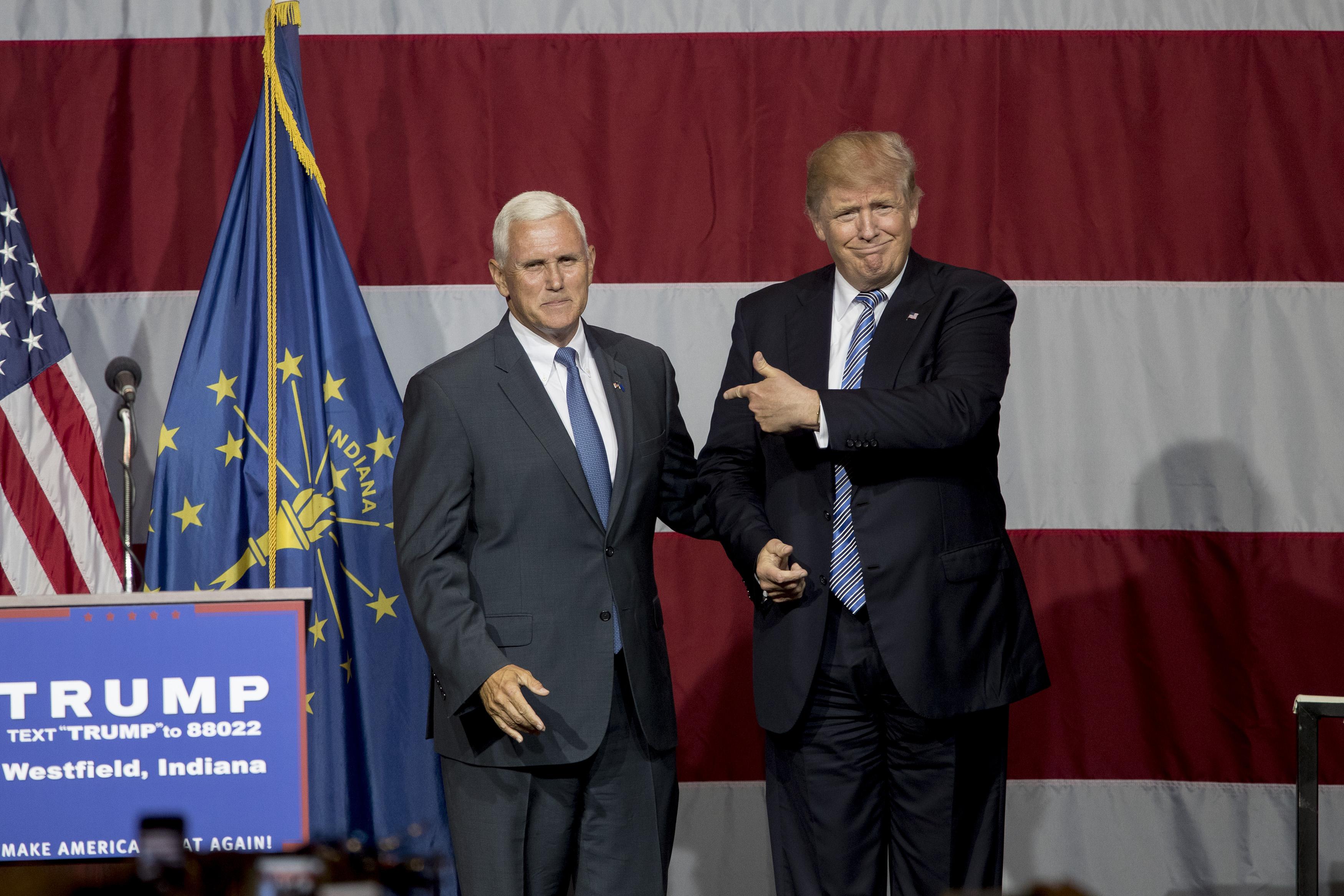When Mike Pence is confronted with difficult questions to which there aren’t any great answers, his eyebrows begin to run up his forehead, as if trying to flee, and his face molds into a look that translates precisely to, Crap, this is a difficult question to which I have no great answer. The nation got a glimpse of that during the hubbub surrounding Indiana’s Religious Freedom and Restoration Act, which Pence, Indiana’s governor, signed into law last year and which he discussed on national television with George Stephanopoulos in the manner of someone trying to swallow his tongue.
If reports from Roll Call, CBS, the Indianapolis Star, New York Times and elsewhere are true, we will see a great deal more of this tongue-swallowing act after Trump unveils Pence as his running mate Friday morning. This will be reckoned a safe pick, a Paul Manafort chess move, and in the Trump universe that is probably true. Pence would reassure conservatives and not cause too much distraction through November from the bottom of the ticket.
The main question is whether the “safe” bottom of the ticket will be able to sell the unruly top of the ticket.
As a six-term House member, Pence was a uniformly conservative vote: hawkish on foreign policy, hawkish on government spending, hawkish on morals. (It’s the last of these that will expose him most to the Clinton campaign’s attacks.) He championed causes like a balanced budget amendment and earmark reform that would eventually gain currency as the Tea Party wave of 2010 brought in reinforcements. He was recruited for and considered other offices—Senate in 2010, president in 2012—but eventually settled on the 2012 governor’s race to replace Mitch Daniels, who also considered a presidential candidacy in 2012.
As governor Pence has pursued conservative ends but has had to make certain compromises not asked of a showy congressman. He took the Medicaid expansion but with his own twists that would allow him to portray it as more conservative. And then there was the RFRA debacle of last year during which he pleased no one: He offered tweaks to satisfy irate members of the business community, allowing social conservatives to criticize him for backing down and liberals to continue hating him for signing the act in the first place. His approval rating fell enough to dim his re-election prospects.
But he doesn’t need to worry about that anymore, because he’s apparently jumped aboard a ship that’s … still very likely to sink. Pence may steady the party enough to make for a less bughouse convention floor next week in Cleveland—it’s not surprising that word began to trickle out as Never Trumpers whipped votes for their final effort to block Trump’s nomination on the rules committee. He would also eliminate some of the November risk of a mouthier candidate with a more scattered résumé, someone like Newt Gingrich, Chris Christie, or Sen. Jeff Sessions. In other words, he does most of what a VP selection should do: not much.
The main concern about the safe pick is that safety may take on a new meaning when deployed in service of Donald Trump. Pence has had his disagreements with Trump throughout the campaign, and if he is indeed VP he may struggle to keep up with Trump’s relentless bullshit. Gingrich may be considerably more insane than Pence, but, as Rich Lowry wrote in Politico this week, he’s probably the only other figure in Republican politics who can match Donald Trump in microwavable glibness. “You could shake Gingrich awake at 3 a.m., tell him Trump just came out for nationalizing the banks,” Lowry writes, “and he would rattle off a five-minute riff on how it has always been the policy of the future and the country is lucky to have such a radical agent of change.”
Pence, especially as a political figure with one eye on his future, would struggle to keep up.
Consider, as another example, how tepid his endorsement of Sen. Ted Cruz was earlier this cycle. He was trying to manage his competing priorities of wanting to piss off neither Cruz nor Trump supporters ahead of his re-election, and he ended up awkwardly praising Trump for a full minute before letting the endorsement slip out almost as an afterthought. He suffers from a certain obviousness: If there’s uncomfortable calculation on his mind, you’ll see it on his face.
But in the short term—just getting through next week!—picking Pence would represent maybe the first professional political move Trump has made: It would show that he can resist the pick that would maximize media frenzy, in deference to durability. That should satisfy, or even surprise, the starchier suits in the party.
